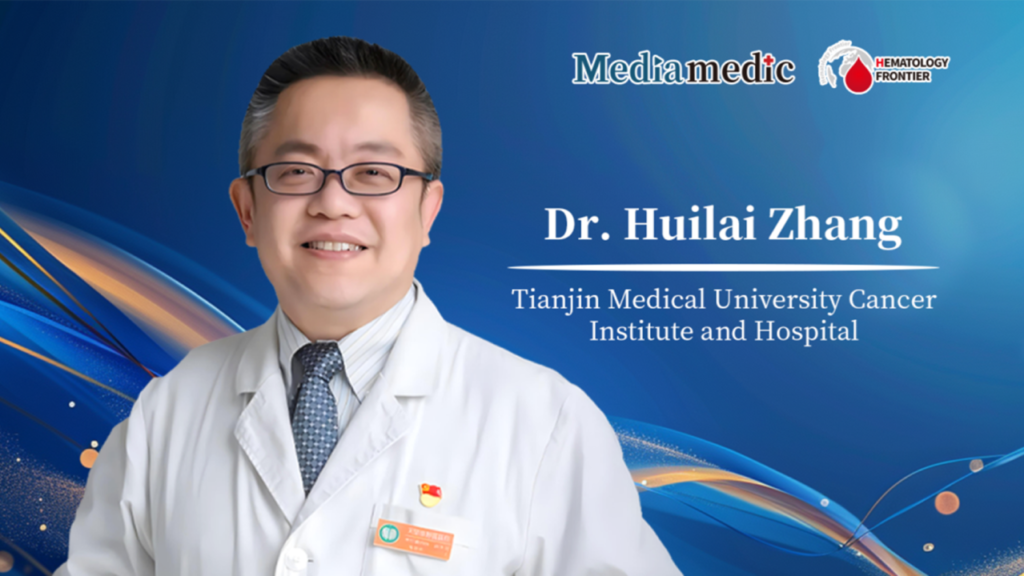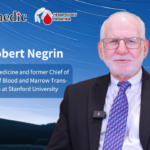
From September 6 to 8, 2024, the 5th Tianjin International Lymphoma Conference was successfully held. The conference featured 12 specialized sessions, including immunotherapy, translational research, and new drug development, creating a platform that fosters international academic exchange and cooperation. During the event, Hematology Frontier had the privilege of interviewing the conference chair, Dr. Huilai Zhang from Tianjin Medical University Cancer Institute & Hospital. He shared insights into the highlights of the conference and the future development of lymphoma research.Hematology Frontier: The 5th Tianjin International Lymphoma Conference features 12 thematic sessions, including a main forum, immunotherapy, translational research, and new drug development. As the executive chair of the conference, could you introduce the highlights and innovations of this event?
Dr. Huilai Zhang: The Tianjin International Lymphoma Conference follows the biennial tradition similar to the Lugano International Conference. Since the first conference in 2016, it has been running for ten years without interruption.
This 5th conference brought together many top experts in the field of lymphoma in China, such as Academician Xishan Hao from Tianjin Medical University Cancer Institute & Hospital and Academician Xiaojun Huang from Peking University Institute of Hematology. We also specially invited prominent speakers from different countries around the world, including Academician Qiang Pan from Karolinska Institute in Sweden, Professor Weiyun Zhuang from the University of California, San Francisco, and Professor Francesco Bertoni from the Institute of Oncology Research in Bellinzona, Switzerland. This greatly expanded the international perspective and academic depth of the conference.
We carefully designed 12 sub-forums covering various topics such as pathology diagnostics, nursing practices, and journal publications, each led by well-known experts in the field to ensure comprehensiveness and professionalism. In particular, the translational medicine session invited leading experts in this field from China, including several Changjiang Scholars and recipients of the National Science Fund for Distinguished Young Scholars. The goal was to create a high-level academic exchange platform to promote the innovation and translation of lymphoma treatment technologies.
The success of each sub-forum is thanks to the strong support and active participation of many domestic and international experts, and I would like to express my sincere gratitude to all of them.
Hematology Frontier: Department development is crucial for hospital growth. As the leader of the lymphoma department at Tianjin Medical University Cancer Institute & Hospital, could you share some experiences in department development?
Dr. Huilai Zhang:When it comes to department development, I personally believe that each department should clearly define its direction and areas of expertise. It’s important to focus and avoid scattering resources. Over the past five to six years, our lymphoma team at Tianjin Medical University Cancer Institute & Hospital has followed this principle and focused on four core areas:
First, our team has consistently focused on researching follicular lymphoma, leveraging China’s large patient population, extensive gene sequencing data, and cutting-edge clinical drug research resources. This focus has enabled Chinese researchers to make significant progress in follicular lymphoma studies.
Second, we have also targeted mantle cell lymphoma, a relatively niche yet important area. In this direction, we collaborate with other domestic centers to share resources and pursue development. We’ve received strong support from internationally renowned experts, such as Professor Michael Wang from MD Anderson Cancer Center. At this year’s European Hematology Association (EHA) Annual Meeting, our team presented the multicenter Polaris study as an oral report.
Third, we have been actively exploring the immune regulation mechanisms in the tumor microenvironment, particularly in CD58 gene research, where we have made some progress. These findings have been published in the prestigious journal Cancer Research. There is vast potential in studying the immune microenvironment, and many unknown areas remain to be explored and discovered in the future.
Fourth, our team also focuses on aggressive lymphomas and extranodal lymphomas, conducting multi-dimensional and multi-level research to provide new approaches and strategies for diagnosing and treating these hard-to-treat lymphomas.
Lastly, I want to emphasize that clear positioning and talent development are critical in department building. We need to create high-quality platforms for research and education, providing young doctors with opportunities and space to grow, which will spark their creativity and professional enthusiasm. Integrating medical care, education, and research is a higher requirement for department leaders and a driving force for the sustained development of the department.
Hematology Frontier: September 15 is World Lymphoma Awareness Day. How do you think we should use this opportunity to raise public awareness of lymphoma and better promote lymphoma prevention and treatment?
Dr. Huilai Zhang: With World Lymphoma Awareness Day (September 15) approaching, Tianjin Medical University Cancer Institute & Hospital has carefully planned a series of events to promote lymphoma knowledge and strengthen patient education, bringing scientific health concepts to the community and the general public. At that time, we will host a series of public lectures on television to convey positive and important medical information to the public.
Lymphoma, as a curable disease, has a treatment outlook that is becoming increasingly bright with the advancement of medical technologies. Significant progress has been made in lymphoma treatment, with doctors now having a more diverse set of therapeutic tools, including the introduction of many innovative drugs. These new therapies have broadened the treatment landscape and brought higher survival rates and improved quality of life for patients. Therefore, we have every reason to believe that the prognosis for lymphoma patients will become more optimistic in the future, with survival times continuing to lengthen! On behalf of the lymphoma team at Tianjin Medical University Cancer Institute & Hospital, I would like to extend my most sincere wishes to all patients fighting lymphoma. May you soon see the light of recovery, regain your health, and smoothly return to your regular work and life, enjoying every beautiful moment life has to offer.
Dr. Huilai Zhang
Ph.D. in Oncology, Chief Physician, Ph.D. Supervisor Currently serving as the Director of the Department of Lymphoma at Tianjin Medical University Cancer Institute & Hospital
Main research areas: Molecular diagnosis and individualized treatment of malignant lymphoma
Main professional roles:
- Member of the Lymphoma Quality Control Expert Committee of the National Cancer Center
- Member of the 9th Board of Directors of the Chinese Anti-Cancer Association
- Vice Chairperson of the Lymphoma Professional Committee of the Chinese Anti-Cancer Association
- Standing Committee Member of the Lymphoma Expert Committee of the Chinese Society of Clinical Oncology (CSCO)
- Member of the Lymphoma Group of the Oncology Branch of the Chinese Medical Association
- Vice Chairperson of the Tumor Immunotherapy Professional Committee of the China Geriatrics Society
- Vice Chairperson of the Lymphoma Professional Committee of the China Geriatrics Society
- Vice President of the Hematology Physicians Branch of the Tianjin Medical Association
- Chairperson of the Tumor Clinical Chemotherapy Professional Committee of the Tianjin Anti-Cancer Association
Professor Zhang has been included in Tianjin’s second batch of high-level health industry talent under the Tianjin Medical Talents Program. He is also a top-tier candidate in the “Clinical Talent Training 123 Climbing Program” of Tianjin Medical University and the leader of an outstanding graduate supervisor team at Tianjin Medical University in 2023. He has received numerous awards, including the third prize of the Chinese Medical Science and Technology Award, the Science Popularization Award of the Chinese Anti-Cancer Association, and the second and third prizes of the Tianjin Science and Technology Progress Award. He has presided over and participated in several National Natural Science Foundation projects and provincial and ministerial research projects.
He currently serves as Deputy Editor-in-Chief of Oncology Pharmacy and as an editorial board member of Chinese Journal of Hematology, Leukemia & Lymphoma, Chinese Journal of Oncology, Hematological Oncology, Blood Research, Discover Oncology, and other domestic and international journals. He has published more than 90 papers as the first or corresponding author in Blood, Cancer Research, Journal of Experimental Medicine, JITC, Leukemia, Clinical and Translational Medicine, American Journal of Hematology, British Journal of Haematology, Blood Advances, International Journal of Cancer, and other international journals, as well as in national core journals. He was awarded the “National Famous Doctor – Outstanding Style” award at the 4th National Famous Doctor Ceremony.


